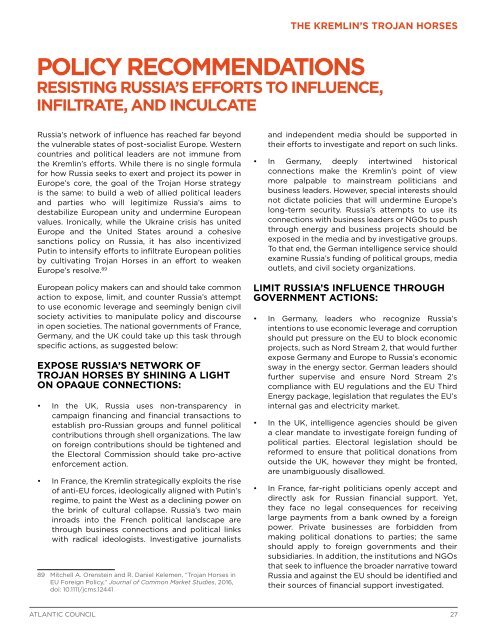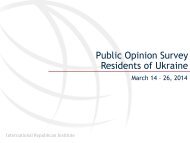You also want an ePaper? Increase the reach of your titles
YUMPU automatically turns print PDFs into web optimized ePapers that Google loves.
THE <strong>KREMLIN’S</strong> <strong>TROJAN</strong> <strong>HORSES</strong><br />
POLICY RECOMMENDATIONS<br />
RESISTING RUSSIA’S EFFORTS TO INFLUENCE,<br />
INFILTRATE, AND INCULCATE<br />
Russia’s network of influence has reached far beyond<br />
the vulnerable states of post-socialist Europe. Western<br />
countries and political leaders are not immune from<br />
the Kremlin’s efforts. While there is no single formula<br />
for how Russia seeks to exert and project its power in<br />
Europe’s core, the goal of the Trojan Horse strategy<br />
is the same: to build a web of allied political leaders<br />
and parties who will legitimize Russia’s aims to<br />
destabilize European unity and undermine European<br />
values. Ironically, while the Ukraine crisis has united<br />
Europe and the United States around a cohesive<br />
sanctions policy on Russia, it has also incentivized<br />
Putin to intensify efforts to infiltrate European polities<br />
by cultivating Trojan Horses in an effort to weaken<br />
Europe’s resolve. 89<br />
European policy makers can and should take common<br />
action to expose, limit, and counter Russia’s attempt<br />
to use economic leverage and seemingly benign civil<br />
society activities to manipulate policy and discourse<br />
in open societies. The national governments of France,<br />
Germany, and the UK could take up this task through<br />
specific actions, as suggested below:<br />
EXPOSE RUSSIA’S NETWORK OF<br />
<strong>TROJAN</strong> <strong>HORSES</strong> BY SHINING A LIGHT<br />
ON OPAQUE CONNECTIONS:<br />
• In the UK, Russia uses non-transparency in<br />
campaign financing and financial transactions to<br />
establish pro-Russian groups and funnel political<br />
contributions through shell organizations. The law<br />
on foreign contributions should be tightened and<br />
the Electoral Commission should take pro-active<br />
enforcement action.<br />
• In France, the Kremlin strategically exploits the rise<br />
of anti-EU forces, ideologically aligned with Putin’s<br />
regime, to paint the West as a declining power on<br />
the brink of cultural collapse. Russia’s two main<br />
inroads into the French political landscape are<br />
through business connections and political links<br />
with radical ideologists. Investigative journalists<br />
89 Mitchell A. Orenstein and R. Daniel Kelemen, “Trojan Horses in<br />
EU Foreign Policy,” Journal of Common Market Studies, 2016,<br />
doi: 10.1111/jcms.12441<br />
and independent media should be supported in<br />
their efforts to investigate and report on such links.<br />
• In Germany, deeply intertwined historical<br />
connections make the Kremlin’s point of view<br />
more palpable to mainstream politicians and<br />
business leaders. However, special interests should<br />
not dictate policies that will undermine Europe’s<br />
long-term security. Russia’s attempts to use its<br />
connections with business leaders or NGOs to push<br />
through energy and business projects should be<br />
exposed in the media and by investigative groups.<br />
To that end, the German intelligence service should<br />
examine Russia’s funding of political groups, media<br />
outlets, and civil society organizations.<br />
LIMIT RUSSIA’S INFLUENCE THROUGH<br />
GOVERNMENT ACTIONS:<br />
• In Germany, leaders who recognize Russia’s<br />
intentions to use economic leverage and corruption<br />
should put pressure on the EU to block economic<br />
projects, such as Nord Stream 2, that would further<br />
expose Germany and Europe to Russia’s economic<br />
sway in the energy sector. German leaders should<br />
further supervise and ensure Nord Stream 2’s<br />
compliance with EU regulations and the EU Third<br />
Energy package, legislation that regulates the EU’s<br />
internal gas and electricity market.<br />
• In the UK, intelligence agencies should be given<br />
a clear mandate to investigate foreign funding of<br />
political parties. Electoral legislation should be<br />
reformed to ensure that political donations from<br />
outside the UK, however they might be fronted,<br />
are unambiguously disallowed.<br />
• In France, far-right politicians openly accept and<br />
directly ask for Russian financial support. Yet,<br />
they face no legal consequences for receiving<br />
large payments from a bank owned by a foreign<br />
power. Private businesses are forbidden from<br />
making political donations to parties; the same<br />
should apply to foreign governments and their<br />
subsidiaries. In addition, the institutions and NGOs<br />
that seek to influence the broader narrative toward<br />
Russia and against the EU should be identified and<br />
their sources of financial support investigated.<br />
ATLANTIC COUNCIL<br />
27



